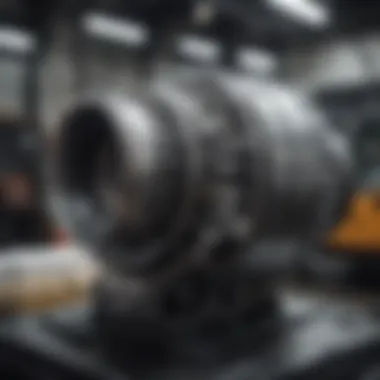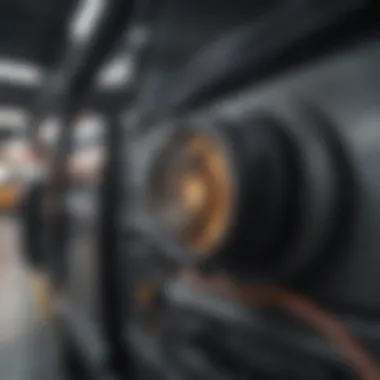Unveiling the Intricacies of the Sprinter Van Engine: A Comprehensive Guide


Automotive Latest News
As the automotive industry continues to evolve, the latest news surrounding Sprinter van engines is of paramount importance. Stay updated on new car launches, industry updates, and technological advancements that directly impact the functioning and performance of these robust engines.
The Sprinter van engine stands as a pinnacle of engineering excellence, encapsulating a blend of efficient fuel systems, intricate electrical components, and exceptional durability. Through this comprehensive guide, we will unravel the enigmatic workings of these engines, shedding light on essential maintenance tips and insights into what propels these versatile vehicles forward.
Car Reviews
In the realm of car reviews, insights into Sprinter van engines are invaluable. Explore expert reviews, user ratings, and comparisons with competitors to grasp the unique offerings and performance benchmarks set by these potent engines.
How-To Guides
Maintenance tips play a crucial role in ensuring the longevity and optimal performance of Sprinter van engines. Delve into DIY repair guides, performance upgrades, and in-depth instructions to keep these powerhouse engines running at peak efficiency.
Automotive Events Coverage
From auto shows to industry conferences, delve into the latest updates on Sprinter van engines at prominent automotive events. Stay informed about car races and immerse yourself in the technological advancements that propel these vehicles to new heights of performance.
Featured Articles
Get an exclusive glimpse behind the scenes at car manufacturers, unveiling the intricate processes involved in crafting Sprinter van engines. Explore future trends and innovations shaping the automotive landscape and influencing the evolution of these mighty powerhouses.
Introduction to Sprinter Van Engines
In this article, we delve into the complex mechanisms that power Sprinter van engines, shedding light on their crucial role in propelling these vehicles forward with efficiency and reliability. Understanding the nuances of Sprinter van engines is paramount for enthusiasts and professionals in the automotive field, as these powertrains are renowned for their robust performance and innovative design.
History and Evolution
Early Engine Designs
Early engine designs mark the inception of Sprinter van engines, laying the foundation for the sophisticated powerhouses we see today. These initial configurations set the stage for advancements in efficiency and performance, shaping the trajectory of engine development. The simplicity and durability of early engine designs make them a noteworthy choice, offering a glimpse into the bygone era of automotive engineering evolution.
Technological Advancements
Technological advancements have revolutionized Sprinter van engines, ushering in an era of unparalleled power and sophistication. These advancements incorporate cutting-edge features and engineering marvels, enhancing overall engine capabilities and fuel efficiency. The integration of state-of-the-art technologies ensures that Sprinter van engines remain at the forefront of innovation, meeting the demands of modern-day automotive standards.
Importance of Engine Efficiency
Optimizing Fuel Consumption


Optimizing fuel consumption is a pivotal aspect of Sprinter van engine operation, ensuring economical and sustainable performance. By fine-tuning fuel efficiency, engine efficiency is maximized, reducing carbon footprint and operating costs. The meticulous calibration of fuel consumption parameters enhances overall operational efficacy, making it a fundamental consideration for engine optimization.
Enhancing Performance
Enhancing performance elevates the driving experience and capabilities of Sprinter van engines, catering to drivers seeking optimal power and responsiveness. By boosting performance metrics, such as horsepower and torque, engine enhancements deliver a dynamic driving experience. The fusion of performance and efficiency results in a balanced powertrain, ideal for both daily commutes and heavy-duty tasks.
Key Components Overview
Cylinder Block and Head
The cylinder block and head form the structural backbone of Sprinter van engines, housing vital components essential for combustion and power generation. These components play a crucial role in ensuring efficient engine operation, facilitating controlled combustion and heat dissipation. The sturdy construction and precise engineering of cylinder blocks and heads contribute to the durability and performance of Sprinter van engines.
Pistons and Connecting Rods
Pistons and connecting rods are integral components that translate combustion energy into rotational motion, driving the vehicle forward. These components undergo intense mechanical stresses during operation, necessitating robust construction and precise engineering. The harmonious interaction between pistons and connecting rods is essential for smooth operational dynamics, ensuring reliable power delivery.
Crankshaft and Camshaft
The crankshaft and camshaft orchestrate intricate movements within Sprinter van engines, synchronizing critical functions for optimal performance. The crankshaft converts linear motion into rotational energy, powering various vehicle systems. On the other hand, the camshaft controls valve timings and ensures efficient combustion processes. The synergistic operation of the crankshaft and camshaft is essential for maintaining engine functionality and performance.
Fuel Systems in Sprinter Van Engines
Fuel systems in Sprinter van engines are a critical aspect of their functionality, responsible for the precise delivery of fuel to the engine for combustion. In this article, we will delve into the specific elements of fuel systems in Sprinter van engines, emphasizing their importance in maintaining optimum performance and efficiency. Understanding the intricacies of fuel systems is essential for maximizing fuel economy, enhancing engine power, and ensuring reliable operation of these vehicles.
Fuel Injection Systems
Fuel injection systems play a pivotal role in modern engine technology, providing a more efficient and controlled method of delivering fuel into the combustion chamber. Within this context, we will explore two primary systems - Common Rail Direct Injection and Electronic Fuel Injection - both integral to the overall performance of Sprinter van engines.
Common Rail Direct Injection
Common Rail Direct Injection is a sophisticated fuel delivery system that operates by maintaining a high-pressure fuel rail. This system allows for precise control over fuel injection timing and quantity, resulting in improved engine efficiency and reduced emissions. It stands out for its ability to enhance power output, optimize fuel combustion, and minimize noise levels, making it a preferred choice for modern diesel engines.
Electronic Fuel Injection
Electronic Fuel Injection, on the other hand, utilizes electronic sensors to monitor engine parameters and adjust fuel delivery accordingly. This system offers better fuel atomization, leading to more efficient combustion and lower exhaust emissions. Its adaptability to varying driving conditions makes it a versatile and responsive choice for Sprinter van engines, ensuring consistent performance across different operating environments.
Fuel Pump Functionality
Efficient fuel pump functionality is crucial for maintaining optimal fuel delivery to the engine, ensuring a steady and controlled supply of fuel for combustion. Here, we will delve into two key aspects - Types of Fuel Pumps and the Importance of Fuel Pressure - highlighting their significance in sustaining engine performance and reliability.


Types of Fuel Pumps
Different types of fuel pumps, such as mechanical, electrical, and even high-pressure pumps, cater to varying engine requirements and fuel delivery systems. Each type offers specific advantages in terms of efficiency, durability, and compatibility with different fuel types. Understanding the characteristics of each fuel pump type is essential for selecting the most suitable option based on the engine's specifications and intended usage.
Importance of Fuel Pressure
Maintaining optimal fuel pressure is vital for ensuring consistent and efficient fuel delivery to the engine. Adequate fuel pressure guarantees proper atomization of fuel particles, facilitating thorough combustion and optimal engine performance. Moreover, maintaining the right fuel pressure helps prevent engine knock, uneven idling, and potential damage to fuel system components. By emphasizing the importance of fuel pressure regulation, Sprinter van engines can operate at peak efficiency while minimizing fuel wastage and emissions.
Electrical Components Systems
Electrical components play a crucial role in the functionality and performance of the Sprinter van engine. These systems are responsible for managing key aspects related to ignition, battery, and charging. Ignition system components such as spark plugs and ignition coils are integral for starting the engine with a spark, while the battery and alternator ensure a consistent power supply to various electrical parts. Understanding the intricacies of these components is essential for optimal engine operation and longevity. Efficient functioning of the electrical systems results in reliable ignition, stable power supply, and overall performance enhancement of the Sprinter van engine. Ensuring proper maintenance of these components is vital for avoiding potential malfunctions and ensuring the smooth operation of the vehicle.
Ignition System
The ignition system is a critical part of the Sprinter van engine, responsible for generating the spark needed to ignite the air-fuel mixture in the cylinders. This process is essential for starting the engine and enabling combustion within the cylinders. Spark plugs are key elements of the ignition system that produce the electrical spark necessary for combustion. They play a significant role in determining engine efficiency and performance. Ignition coils are another essential component that transforms low voltage from the battery into high voltage required to create the spark within the spark plugs. Together, these components ensure proper ignition timing and consistent combustion, contributing to the overall functionality of the engine. Understanding the intricacies of the ignition system is crucial for maintaining optimal engine performance and addressing any potential issues efficiently.
Spark Plugs
Spark plugs are vital components of the ignition system, responsible for creating the spark that ignites the air-fuel mixture in the combustion chamber. The design and quality of spark plugs significantly impact engine performance, fuel efficiency, and emission levels. Platinum-tipped spark plugs, for instance, offer enhanced durability and conductivity, resulting in more reliable ignition and prolonged lifespan. By providing a consistent and precise spark, platinum spark plugs contribute to smoother engine operation and improved overall efficiency. Despite their higher cost compared to traditional spark plugs, the benefits they offer in terms of longevity and performance make them a popular choice for modern engines.
Ignition Coils
Ignition coils are essential components that amplify the electrical power from the battery to generate the high-voltage spark needed for ignition. High-quality ignition coils enhance the efficiency and effectiveness of the ignition system, ensuring reliable engine starting and operation. Coil-on-plug ignition systems, for example, offer individual coil packs for each spark plug, delivering higher energy output and precise timing control. This design eliminates the need for spark plug wires, reducing energy loss and improving ignition performance. By understanding the unique features and advantages of ignition coils, it becomes evident how crucial they are for sustaining optimal engine functionality and performance.
Battery and Charging System
The battery and charging system of the Sprinter van engine are integral for providing electrical power to various components and systems. The battery serves as a storage unit for electrical energy, supplying power during engine start-up and when the alternator output is insufficient. Meanwhile, the alternator converts mechanical energy from the engine into electrical energy to charge the battery and power the vehicle's electrical systems. Ensuring the proper maintenance of the battery and charging system is essential for reliable engine starting, electrical component operation, and overall vehicle performance.
Battery Types and Maintenance
The battery type and maintenance practices significantly impact the performance and longevity of the electrical system in a vehicle. Maintenance-free batteries, for example, require minimal upkeep and offer hassle-free operation, making them a popular choice for modern vehicles. Regularly checking the battery's fluid levels, ensuring secure connections, and routine inspections are essential for preventing potential issues and ensuring optimal battery performance. By understanding the specific requirements and characteristics of different battery types, drivers can make informed decisions regarding maintenance and replacement, promoting the longevity and reliability of the electrical system.
Alternator Functionality
The alternator is a crucial component of the charging system, responsible for generating electrical power to charge the battery and power the vehicle's electrical systems. Its functionality directly impacts the performance and operation of various electrical components, including lights, electronics, and ignition systems. High-output alternators offer enhanced charging capacity and efficiency, ensuring a steady power supply for demanding electrical loads. Understanding the key characteristics and unique features of alternators is essential for maintaining a robust charging system, maximizing battery life, and supporting the overall performance of the Sprinter van engine.
Cooling and Lubrication Systems
Cooling and lubrication systems play a paramount role in maintaining the optimal functionality and longevity of a Sprinter van engine. These systems are indispensable for managing the engine's temperature and ensuring smooth operation. By regulating the temperature within the engine, cooling systems prevent overheating, which can lead to severe damage. Additionally, lubrication systems ensure that all moving parts are adequately lubricated to minimize friction and reduce wear and tear. Proper maintenance of these systems is crucial to the overall performance and reliability of the engine.


Coolant Circulation
Radiator and Thermostat
The radiator and thermostat are integral components of the coolant circulation system in a Sprinter van engine. The radiator acts as a heat exchanger, dissipating heat absorbed from the engine coolant. It comprises a series of tubes and fins through which the coolant flows, facilitating heat transfer to the surrounding air. The thermostat, on the other hand, regulates the coolant flow based on the engine's temperature. This ensures that the engine operates within the optimal temperature range, enhancing efficiency and preventing overheating.
The radiator's design optimizes heat dissipation, maximizing cooling efficiency. Its aluminum construction, with a large surface area for heat exchange, enables rapid cooling of the coolant. Furthermore, the use of a finned structure enhances air circulation around the radiator, promoting effective heat transfer. Despite its benefits, the radiator may be susceptible to corrosion over time, necessitating periodic inspection and maintenance to ensure continuous functionality.
Water Pump Operation
The water pump is a vital component of the cooling system, responsible for circulating coolant throughout the engine. It plays a crucial role in maintaining consistent coolant flow, preventing overheating and facilitating efficient heat dissipation. The water pump operates by utilizing a pulley and belt system connected to the engine, which drives impellers to propel coolant through the system.
Efficient water pump operation is vital for sustained engine performance. Its robust construction and well-lubricated bearings contribute to reliable coolant circulation. Additionally, modern water pumps are designed for longevity and durability, with high-quality seals to prevent leaks and maintain optimal performance. However, regular inspection and servicing are necessary to detect any issues promptly and ensure the water pump operates effectively.
Oil Circulation and Maintenance
Proper oil circulation and maintenance are critical aspects of engine functionality and longevity. Oil serves as a lubricant, minimizing friction between moving parts and reducing wear. Regular oil changes are essential to remove contaminants and maintain the oil's lubricating properties, safeguarding engine components from premature wear and damage.
Importance of Oil Changes
Regular oil changes are essential for preserving engine health and performance. Fresh oil reduces friction, enhances lubrication, and helps dissipate heat generated during engine operation. It also plays a vital role in carrying away debris and contaminants, preventing sludge buildup and ensuring the engine operates smoothly.
Adhering to a routine oil change schedule is paramount to prolonging engine life and preventing mechanical issues. Neglecting oil changes can result in decreased lubrication effectiveness, leading to increased wear on engine components and reduced efficiency. By prioritizing regular oil changes, vehicle owners can maintain peak engine performance and prolong the engine's lifespan.
Oil Filter Function
The oil filter is a vital component that complements the oil in maintaining engine cleanliness and performance. It traps contaminants and debris suspended in the oil, preventing them from circulating through the engine and causing damage. The oil filter's design features a porous media element that captures impurities while allowing clean oil to flow through, ensuring optimal lubrication of engine parts.
An efficient oil filter enhances engine protection by removing harmful particles that can compromise performance and durability. Selecting a high-quality oil filter suited to the engine's requirements is essential for effective filtration and longevity. Regular replacement of the oil filter during oil changes is imperative to prevent clogs and maintain oil purity, safeguarding the engine from potential harm.
Engine Maintenance Tips
Engine maintenance is a critical aspect of ensuring optimal performance and longevity of your Sprinter van engine. By adhering to a regular maintenance routine, you can preemptively address issues and prevent costly breakdowns. This section will delve into key maintenance tips to keep your Sprinter van engine running smoothly.
Regular Inspections and Checks
- Fluid Levels Monitoring: Proper monitoring of fluid levels is essential for the overall health of your engine. Checking engine oil, coolant, and other vital fluids at regular intervals can help identify leaks or potential issues early on. Fluid levels monitoring is a fundamental practice in engine maintenance, ensuring proper lubrication and cooling to prevent overheating and friction-related damage.
- Belt and Hose Inspections: Belts and hoses play a crucial role in powering various components of the engine. Regular inspection of belts for wear and tension, as well as checking hoses for leaks or cracks, is paramount. Belt and hose inspections help in preventing sudden failures that can lead to more significant engine damage. By proactively addressing issues, you can avoid disruptions to your travel plans and costly repairs.
Understanding Warning Signs
- Diagnostic Trouble Codes: Modern vehicles are equipped with onboard diagnostics that generate error codes when systems malfunction. Understanding these diagnostic trouble codes (DTCs) can provide valuable insights into potential issues within the engine. By decoding and addressing DTCs promptly, you can resolve underlying problems before they escalate, saving you time and money on repairs.
- Unusual Engine Noises: Unusual sounds emanating from the engine can indicate various issues, from loose components to internal damage. Recognizing and diagnosing these unusual engine noises early on is crucial in preventing further mechanical complications. By addressing the source of the sounds promptly, you can avoid extensive engine damage and ensure continued performance.
Consulting Professional Mechanics
- Choosing Qualified Technicians: When seeking maintenance or repairs for your Sprinter van engine, selecting skilled and experienced technicians is paramount. Qualified technicians possess the expertise and knowledge to diagnose and resolve engine-related issues efficiently. By entrusting your vehicle to certified professionals, you can ensure that it receives the necessary care and attention it deserves.
- Maintenance Schedule Adherence: Adhering to the manufacturer's recommended maintenance schedule is key to preserving the optimal functioning of your Sprinter van engine. Regular servicing, oil changes, and inspections outlined in the maintenance schedule help in early detection of potential problems. By following the prescribed maintenance intervals, you can enhance the durability and performance of your engine, ultimately increasing its lifespan.



